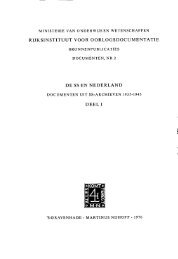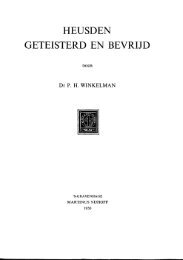De razzia van Rotterdam. 10-11 november 1944 - KNAW
De razzia van Rotterdam. 10-11 november 1944 - KNAW
De razzia van Rotterdam. 10-11 november 1944 - KNAW
Create successful ePaper yourself
Turn your PDF publications into a flip-book with our unique Google optimized e-Paper software.
SUMMARY 2 6 9<br />
Between 5 and 6 o’clock in the morning all outer suburban districts of <strong>Rotterdam</strong>,<br />
including the area of Schiedam, had been occupied by German detachments. The<br />
town’s central districts had been isolated. On November <strong>10</strong> the <strong>razzia</strong> was carried<br />
out in the suburbs, on November <strong>11</strong> it was the turn of the centre. The German<br />
organisation was such that it was impossible to move from one district to another.<br />
The bridges and the tunnel linking the town’s Southern and northern part were<br />
occupied by the Germans. Both <strong>Rotterdam</strong> and Schiedam were divided into different<br />
areas each under the command of a German officer, who in his turn had a number<br />
of detachments under his control. Thus each area was subdivided into sub-areas,<br />
which were so small that the closing off of streets and blocks of houses offered no<br />
special difficulties.<br />
The <strong>Rotterdam</strong> districts south of the river Maas might have been difficult to comb<br />
through. Many possibilities for escape were offered by the extensive harbour works.<br />
This part of the town, however, had a particularly dense population.<br />
Methods of intimidation were to be most effective here. House-block after house-<br />
block was encircled and searched. People were unable to contact each other. No<br />
systematic plans could be made. In several places the Germans occupied the rooftops.<br />
Usually the decision whether or not to obey the printed German order — which had<br />
been distributed from house to house — had to be taken within the family.<br />
Possibilities for hiding were few. After the <strong>razzia</strong> many ingenious hiding-places<br />
were constructed, but these could not be improvised.<br />
These material factors combined with the emotional pressure exerted on the<br />
population of <strong>Rotterdam</strong> by over four years of war enabled the Germans to capture<br />
several tens of thousands of men relatively easily.<br />
How did the <strong>razzia</strong> present itself to the people?<br />
Those who had been working in the town’s central districts in the night preceding<br />
the <strong>razzia</strong> tried to regain their homes as quickly as possible. Most of them were unable<br />
to do so. Their nervousness increased as they became aware of the fact that the areas<br />
where they lived had been cordoned off. A few people succeeded in rowing across<br />
the river Maas. This method of communication was quickly stopped by the Germans,<br />
who started patrolling the river.<br />
At about 7 o’clock in the morning the first large groups of the working population<br />
left their homes and entered the streets. They intended to go to work, but they quickly<br />
discovered that a <strong>razzia</strong> was being held. In some streets these people were told to<br />
go to a given spot, in others they were sent back home without any explanation being<br />
given. Those who returned home, warned their friends and neighbours, some of whom<br />
were still sleeping. Others woke up as a result of the excited talking of their neighbours.<br />
No one knew what was really going on. The only thing that was clear was that<br />
nobody was allowed to leave the Street where he was living. In many cases the tension<br />
caused by uncertainty decreased only when the German order to report for “work”<br />
was issued or announced.<br />
In some parts of the town the Germans had started early distributing the handbills.






